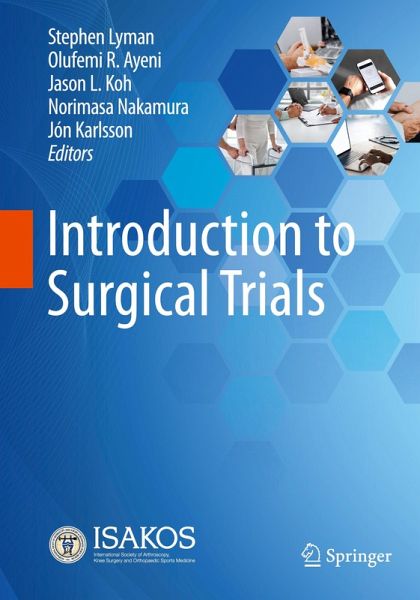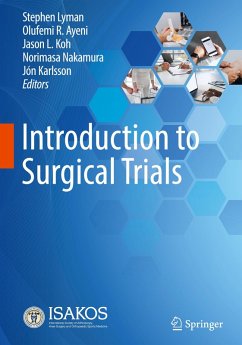
Introduction to Surgical Trials
Versandkostenfrei!
Versandfertig in 1-2 Wochen
75,99 €
inkl. MwSt.

PAYBACK Punkte
38 °P sammeln!
Filling a gap in literature, this book examines surgical trials with a special focus on the underlying principles, challenges, and best practices to successfully conduct rigorous surgical research.While randomized controlled trials (RCTs) remain the gold standard for evaluation of the safety and efficacy of most medical interventions, they are particularly difficult to implement successfully in the context of surgery. As a result, recruitment rates are often extremely low, crossover from non-operative to operative is common, and patients randomly allocated to surgery often simply decline to ha...
Filling a gap in literature, this book examines surgical trials with a special focus on the underlying principles, challenges, and best practices to successfully conduct rigorous surgical research.
While randomized controlled trials (RCTs) remain the gold standard for evaluation of the safety and efficacy of most medical interventions, they are particularly difficult to implement successfully in the context of surgery. As a result, recruitment rates are often extremely low, crossover from non-operative to operative is common, and patients randomly allocated to surgery often simply decline to have the procedure. All of these challenges call into question the recent generalizability and fundamental quality of traditional surgical RCTs.
As such, this book explores advanced alternative trial design methods and describes the current regulatory environment around the world. Designed as a practical guide, it is a valuable tool for surgeons, epidemiologist and biostatisticiansinvolved in this challenging field.
While randomized controlled trials (RCTs) remain the gold standard for evaluation of the safety and efficacy of most medical interventions, they are particularly difficult to implement successfully in the context of surgery. As a result, recruitment rates are often extremely low, crossover from non-operative to operative is common, and patients randomly allocated to surgery often simply decline to have the procedure. All of these challenges call into question the recent generalizability and fundamental quality of traditional surgical RCTs.
As such, this book explores advanced alternative trial design methods and describes the current regulatory environment around the world. Designed as a practical guide, it is a valuable tool for surgeons, epidemiologist and biostatisticiansinvolved in this challenging field.












